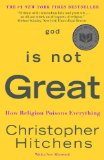Summary | Excerpt | Reading Guide | Reviews | Readalikes | Genres & Themes | Author Bio

Critics' Opinion:
Readers' Opinion:
First Published:
May 2007, 307 pages
Paperback:
Apr 2009, 272 pages
So the famous misquotation is not so much a “misquotation” but rather a very crude attempt to misrepresent the philosophical case against religion. Those who have believed what the priests and rabbis and imams tell them about what the unbelievers think and about how they think, will find further such surprises as we go along. They will perhaps come to distrust what they are told—or not to take it “on faith,” which is the problem to begin with.
Marx and Freud, it has to be conceded, were not doctors or exact scientists. It is better to think of them as great and fallible imaginative essayists. When the intellectual universe alters, in other words, I don’t feel arrogant enough to exempt myself from self-criticism. And I am content to think that some contradictions will remain contradictory, some problems will never be resolved by the mammalian equipment of the human cerebral cortex, and some things are indefinitely unknowable. If the universe was found to be finite or infinite, either discovery would be equally stupefying and impenetrable to me. And though I have met many people much wiser and more clever than myself, I know of nobody who could be wise or intelligent enough to say differently.
Thus the mildest criticism of religion is also the most radical and the most devastating one. Religion is man-made. Even the men who made it cannot agree on what their prophets or redeemers or gurus actually said or did. Still less can they hope to tell us the “meaning” of later discoveries and developments which were, when they began, either obstructed by their religions or denounced by them. And yet—the believers still claim to know! Not just to know, but to know everything. Not just to know that god exists, and that he created and supervised the whole enterprise, but also to know what “he” demands of us—from our diet to our observances to our sexual morality. In other words, in a vast and complicated discussion where we know more and more about less and less, yet can still hope for some enlightenment as we proceed, one faction—itself composed of mutually warring factions—has the sheer arrogance to tell us that we already have all the essential information we need. Such stupidity, combined with such pride, should be enough on its own to exclude “belief” from the debate. The person who is certain, and who claims divine warrant for his certainty, belongs now to the infancy of our species. It may be a long farewell, but it has begun and, like all farewells, should not be protracted.
I trust that if you met me, you would not necessarily know that this was my view. I have probably sat up later, and longer, with religious friends than with any other kind. These friends often irritate me by saying that I am a “seeker,” which I am not, or not in the way they think. If I went back to Devon, where Mrs. Watts has her unvisited tomb, I would surely find myself sitting quietly at the back of some old Celtic or Saxon church. (Philip Larkin’s lovely poem “Church-going” is the perfect capture of my own attitude.) I once wrote a book about George Orwell, who might have been my hero if I had heroes, and was upset by his callousness about the burning of churches in Catalonia in 1936. Sophocles showed, well before the rise of monotheism, that Antigone spoke for humanity in her revulsion against desecration. I leave it to the faithful to burn each other’s churches and mosques and synagogues, which they can always be relied upon to do. When I go to the mosque, I take off my shoes. When I go to the synagogue, I cover my head. I once even observed the etiquette of an ashram in India, though this was a trial to me. My parents did not try to impose any religion: I was probably fortunate in having a father who had not especially loved his strict Baptist/Calvinist upbringing, and a mother who preferred assimilation—partly for my sake—to the Judaism of her forebears. I now know enough about all religions to know that I would always be an infidel at all times and in all places, but my particular atheism is a Protestant atheism. It is with the splendid liturgy of the King James Bible and the Cranmer prayer book—liturgy that the fatuous Church of England has cheaply discarded—that I first disagreed. When my father died and was buried in a chapel overlooking Portsmouth—the same chapel in which General Eisenhower had prayed for success the night before D-Day in 1944—I gave the address from the pulpit and selected as my text a verse from the epistle of Saul of Tarsus, later to be claimed as “Saint Paul,” to the Philippians (chapter 4, verse 8):
Copyright © 2007 by Christopher Hitchens





The House on Biscayne Bay
by Chanel Cleeton
As death stalks a gothic mansion in Miami, the lives of two women intertwine as the past and present collide.

The Flower Sisters
by Michelle Collins Anderson
From the new Fannie Flagg of the Ozarks, a richly-woven story of family, forgiveness, and reinvention.

The Funeral Cryer by Wenyan Lu
Debut novelist Wenyan Lu brings us this witty yet profound story about one woman's midlife reawakening in contemporary rural China.
Your guide toexceptional books
BookBrowse seeks out and recommends the best in contemporary fiction and nonfiction—books that not only engage and entertain but also deepen our understanding of ourselves and the world around us.